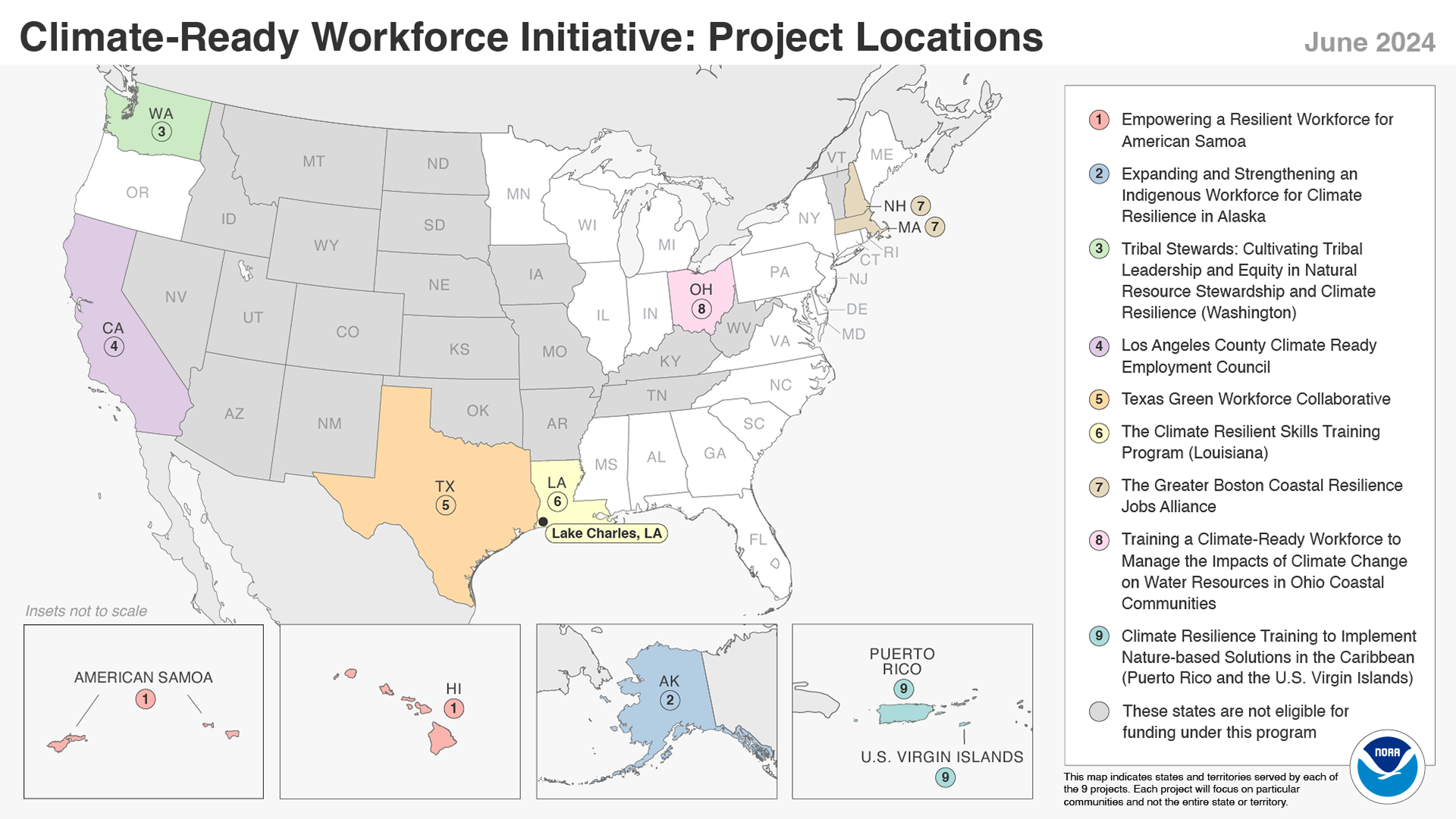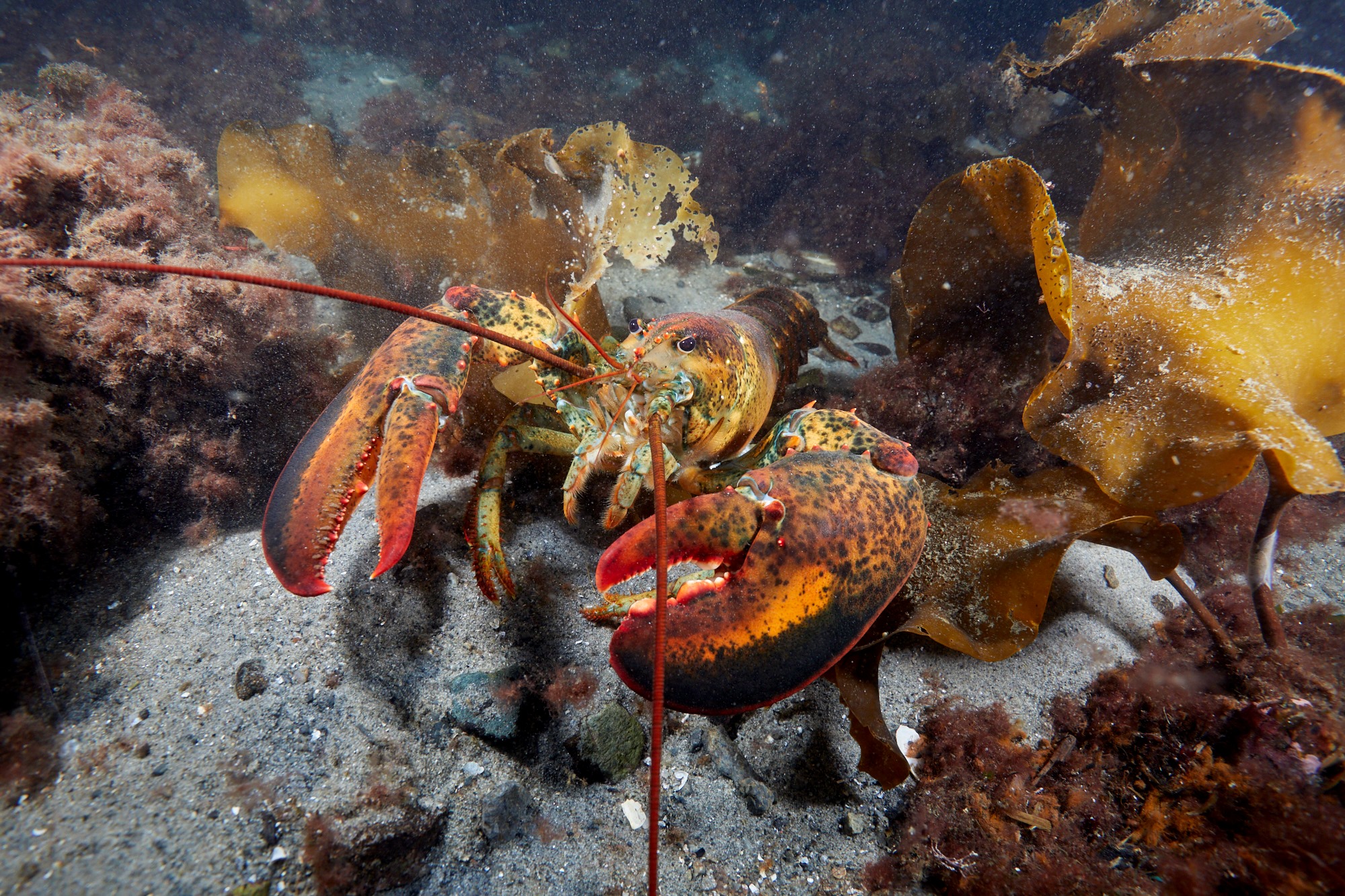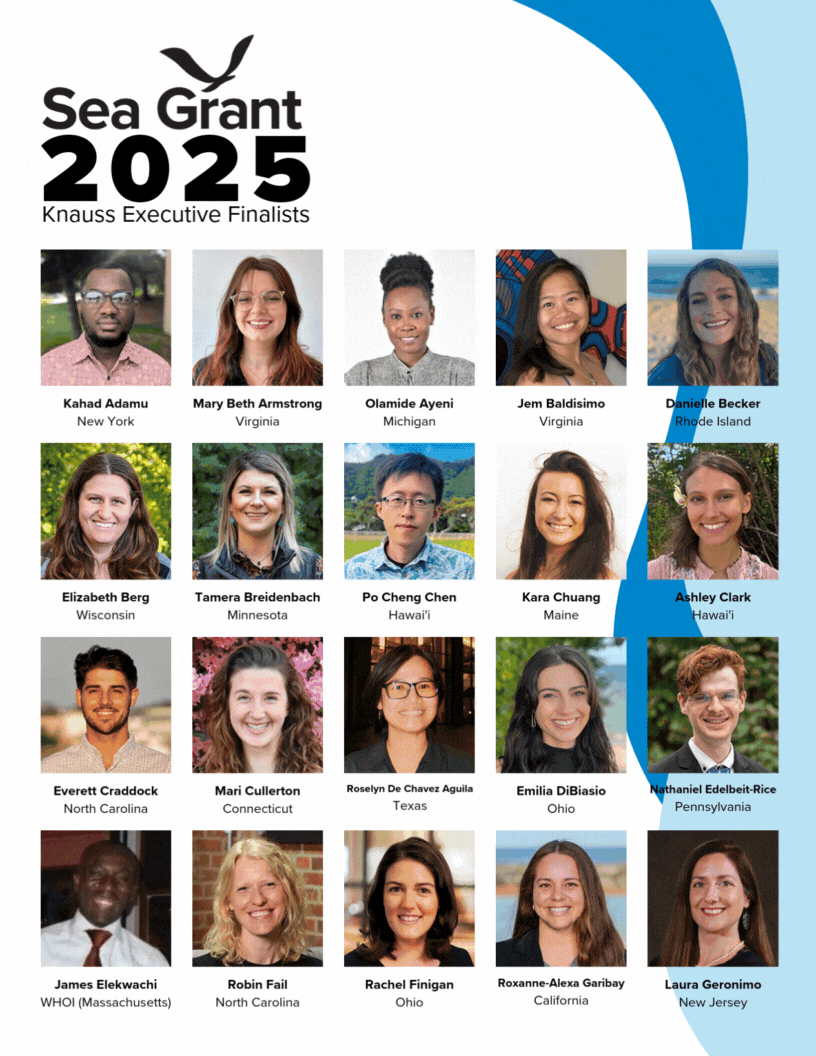Funding from NOAA’s Climate-Ready Workforce initiative will support training and jobs to accelerate climate resilience

Today, the Department of Commerce and NOAA announced $60 million in funding to help train and place people in jobs that advance a climate-ready workforce for coastal and Great Lakes states, Tribes and Territories as part of President Biden’s Investing in America agenda under the Inflation Reduction Act. To date, awards like these from President Biden’s Investing in America agenda have created more than 270,000 jobs across the country.
The funding will support nine projects around the nation, with $50 million going directly to the projects and $10 million for technical assistance to support the grantees.
These funds, part of NOAA’s Climate-Ready Workforce initiative, will allow NOAA’s National Sea Grant College Program, Climate Program Office and Office for Coastal Management to fund sectoral partnerships that will develop and implement job training programs. These programs will include wraparound services to help make training opportunities more accessible.
“Thanks to the leadership of President Biden, this major investment in public, private and educational organizations will train workers from around our coasts and help them find good-paying jobs that strengthen climate resilience and local economies,” said U.S. Secretary of Commerce Gina Raimondo. “Climate change accelerates the need for a new generation of skilled workers who can help communities address a wide range of climate impacts including sea level rise, flooding, water quality issues and the need for solutions such as renewable energy.”
Modeled after the Economic Development Administration’s successful Good Jobs Challenge, the Climate-Ready Workforce initiative is uniquely focused on preparing and placing people in good jobs that will advance climate resilience nationwide, ensuring coastal communities are prepared for the worst impacts of climate change. The program will also assist employers in developing a 21st-century workforce that is climate literate and skilled at addressing climate challenges.
“Our goal of building climate resilience across the nation depends upon creating a trained, well-paid and supported climate-ready workforce,” said NOAA Administrator Rick Spinrad, Ph.D. “Each of these projects in coastal, Tribal and Territorial communities is tailored to tackle the most pressing climate needs of their communities and will focus on recruiting people for training and jobs from disadvantaged communities that are disproportionately affected by climate change impacts.”
Today’s announcement builds on more than $50 billion of resilience investments across the President’s Investing in America Agenda, which includes investments designed to ensure communities across the country are prepared for the worst impacts of climate change.
Nine projects located across the country were selected through a competitive process.
Selected Projects
Empowering a resilient workforce for American Samoa
Hawaiʻi Sea Grant & American Samoa Community College: $1,748,942
This program will address urgent climate impacts in American Samoa, which is experiencing one of the highest rates of relative sea level rise in the world. This program will train individuals for jobs in water and wastewater treatment operations to fill vacancies at the American Samoa Power Authority, the territory’s only utility company and a partner in the program. The power authority provides electric power, trash pickup and drinking water to the community.
Expanding and strengthening an Indigenous workforce for climate resilience in Alaska
Tribal Government of St. Paul Island: $2,306,004
This project aims to address the demand for climate-resilient monitoring programs and local workforce development in Alaska by leveraging existing capacity within the Tribal Government of St. Paul Island’s Indigenous Sentinels Network, the Bering Sea Research Center and a partnership with Iḷisaġvik College, Alaska’s Tribal college. This collaborative effort will engage a diverse network of climate service practitioners, including Indigenous community leaders, state agencies, academic institutions and nonprofits. The network will support climate resilience workforce development that incorporates Indigenous knowledge of climate research in the development of Indigenous-led environmental monitoring programs.
Tribal Stewards: Cultivating Tribal leadership & equity in natural resource co-stewardship & climate resilience
Washington State Board for Community and Technical Colleges: $9,257,231
This partnership between community colleges and Tribal Nations aims to cultivate a new generation of Tribal leaders and co-stewards adept in integrative natural resources management and climate resilience. Through holistic support and redesigned educational pathways, the Tribal Stewards initiative will train both Tribal and non-Tribal graduates to contribute to co-stewardship, collaboration and climate resilience efforts that serve Tribal communities. This critical partnership embodies a commitment to equity, Tribal sovereignty and cultivating a diverse workforce equipped to tackle the complex challenges of the climate change era.
Los Angeles County Climate Ready Employment Council
Long Beach City College: $9,500,000
This project will establish the Los Angeles County Climate Ready Employment Council to develop training, internship and job placement services for key occupations in the water and solar sectors that are demanding workers. These jobs will include wastewater treatment operators, solar technicians and installers and electricians to service both industries. The council will work with industries and experts to develop the training curriculum. The council will also conduct a comprehensive needs assessment to identify the skills and training needed to meet the jobs that are in highest demand for climate resiliency. By participating in the employment council, partner employers will have access to a pipeline of qualified workers trained for in-demand occupations in their industry sector.
Texas Green Workforce Collaborative
EarthShare Texas: $2,146,559
The Texas Green Workforce Collaborative will create a sustainable, high-impact model for inclusive recruitment, skill-building, job training and certification, mentorship and community engagement among partners. This model will empower Texans from low-income and disadvantaged communities to pursue in-demand, living-wage green careers in various fields, including conservation, renewable energy and resilience, urban agriculture, green infrastructure, water management and more.
The Climate Resilient Skills Training Program
Flood Mitigation Industry Association: $6,926,245
The Flood Mitigation Industry Association along with strategic partners and climate resilience subject matter experts will develop the Climate Resilient Skills Training Program to provide coastal community, climate-resilient skilled workers in hard-hit Louisiana. The curriculum will be informed by climate science, real-time metrics and specialized flood mitigation and resilience industry knowledge. The program will recruit from local communities that are underserved and train and place workers with newly acquired skills including dry floodproofing, structural elevation and application of nature-based solutions, in competitively paying green-collar trade jobs.
The Greater Boston Coastal Resilience Jobs Alliance
Economic Development & Industrial Corporation of Boston: $9,799,687
This program in Massachusetts and New Hampshire will address the need for a skilled climate resilience workforce to implement Boston’s Climate Ready Boston Coastal Climate Resilience Plan and Massachusetts’ ResilientMass Plan. Participants will gain skills and jobs in areas ranging from nature-based solutions to emergency preparedness and response.
Training a climate-ready workforce to manage the impacts of climate change on water resources in Ohio coastal communities
The Ohio State University: $4,852,566
The Ohio State University, in partnership with a community coalition, local utility services, community and Historically Black Colleges and Universities and consulting employers, will train climate-ready workers — including technicians, scientists and engineers — to fulfill the specialized workforce needs of the water industry in the Great Lakes. Through a knowledge and skills-building framework in water quality monitoring and modeling, geographic information systems, stormwater infrastructure and environmental policy and management, participants will form a diverse, digitally fluent workforce at various career levels and with the expertise to provide their communities with climate-resilient solutions for water system services in the coast of Lake Erie.
Climate resilience training to implement nature-based solutions in the Caribbean
Protectores de Cuencas Inc.: $3,462,766
Islands situated in the Caribbean, Puerto Rico and the U.S. Virgin Islands are vulnerable to the effects of climate change, including tropical storms, drought, extreme heat and sea level rise. Reducing existing threats to ecological systems and increasing their resilience is essential for climate adaptation. The project will identify, prioritize and provide training for jobs in ecological conservation and restoration that are in demand. These may include design and maintenance of nature-based solutions including mangrove and wetland restoration, stormwater green infrastructure, flood and coastal hazard mitigation, erosion prevention, native plant use in restoration projects and monitoring program development.
Download a complete list of the funded projects and descriptions here.
The Climate-Ready Workforce for Coastal States, Tribes and Territories Initiative advances the Biden-Harris Investing in America agenda in multiple ways.
First, this work is a component of the $3.3 billion investment in NOAA’s Climate-Ready Coasts and Communities Initiative through the Inflation Reduction Act to help American communities prepare, adapt and build resilience to weather and climate events. Visit NOAA’s Bipartisan Infrastructure Law and Inflation Reduction Act websites to learn how NOAA is collaborating with communities to build a Climate-Ready Nation and to see current and future funding opportunities.
“Sea Grant and our partners are pleased to address these critical workforce development needs to support our coastal and Great Lakes communities across the nation,” said Jonathan Pennock, director of NOAA’s National Sea Grant College Program. “Sea Grant is uniquely positioned to help meet these needs through our emphasis on regional and place-based partnerships, leveraging local expertise and resources to make a meaningful impact on coastal communities.”
Second, the Climate-Ready Workforce initiative also advances the Department of Commerce’s workforce agenda, which focuses on preparing workers with the education and skills necessary to accelerate the development and deployment of critical and emerging technologies, which are essential to U.S. economic competitiveness and national security. As first developed under the Good Jobs Challenge and now through the Climate-Ready Workforce Initiative, the Department’s approach to workforce investment programs is employer-led, worker-centric and focused on equity.
Third, every awarded project supports communities that have been identified as disadvantaged by the Climate and Economic Justice Screening Tool, including Tribes and other communities on the frontline of the climate crisis. This program advances President Biden’s Justice40 Initiative, which sets a goal that 40% of the overall benefits of certain federal climate, clean energy, affordable and sustainable housing and other investments flow to disadvantaged communities that have been historically marginalized by underinvestment and overburdened by pollution and intensifying climate impacts.
Ensuring American workers have the skills and training necessary to tackle the climate crisis is critical, which is why President Biden Launched the American Climate Corps – a groundbreaking, workforce training and service initiative that will put tens of thousands of young Americans to work fighting the impacts of climate change.
“Our climate is changing rapidly and the demand for authoritative climate information, tools, knowledge and resources is growing to keep pace,” said Benjamin DeAngelo, Climate Program Office acting director. “These Climate-Ready Workforce projects will enable the equitable provision of climate services in the form of job creation across a diverse range of communities and economic sectors.”


Amara Davis
Outreach Coordinator
National Sea Grant Office



